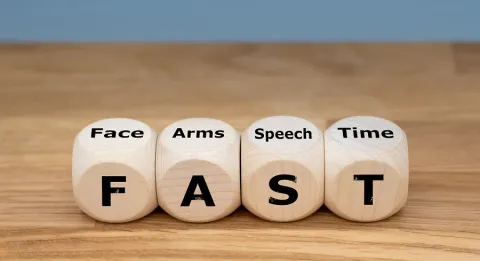Can Acronyms Save Your Life When It Comes to a Stroke?

When it comes to stroke, the answer is an absolute yes! Learn the ABC(S) of stroke prevention and how to act FAST if you think someone is having one. But there is so much more that you need to know about, from not-so-common symptoms to the importance of speedy medical treatment.
Because I’m an emergency physician, I want you to realize that the decision to wait out the symptoms of stroke could greatly impact the likelihood of recovery. More importantly, however, I don’t ever want to see you or your loved ones needing the emergency room in the first place. Prevention is the most important thing you can do for your health.
ABC(S) of Stroke Prevention
- Aspirin: Aspirin may help lower your risk for stroke. But do not take aspirin if you think you’re having a stroke. It can make some types of stroke worse. Check with your doctor about taking aspirin first.
- Blood Pressure: Control your blood pressure.
- Cholesterol: Control your cholesterol.
- Smoking: Quit smoking or don’t start.
Are there other causes of stroke that aren’t so prevalent? There sure are. Besides the ones above, be aware that atherosclerosis (narrowing of arteries due to plaque buildup); diabetes; heart problems, such as atrial fibrillation; blood disorders, such as sickle cell disease; and IV drug use can put people at risk.
Black people have significantly higher rates of stroke because they have higher rates of the risk factors that lead to stroke. These include high blood pressure, diabetes, sickle cell disease and underlying health care inequities related to access to care.
Act FAST if Someone Could Be Having a Stroke
- Face drooping: Ask the person to smile. Does one side of the face droop or is it numb?
- Arm weakness: Ask the person to raise both arms. Is one arm weak or numb? Does one arm drift downward?
- Speech difficulty: Ask the person to repeat a simple sentence (e.g., “The sky is blue.”). Is the sentence repeated correctly? Is speech slurred, are they unable to speak, or are they hard to understand?
- Time to call 911: If the person shows any of these symptoms, even if the symptoms go away, call 911 and get them to the hospital immediately.
Are there other signs of stroke that may not be so obvious? Yes, there are. You may experience just one of these symptoms or a combination of some.
- Sudden trouble seeing in one or both eyes
- Sudden trouble walking, dizziness, loss of balance or coordination
- Sudden severe headache with no known cause
- Sudden numbness or weakness of your face, arm, or leg, especially on one side of the body
- Sudden confusion, trouble speaking or understanding speech
Time is Brain
Call 911 immediately with any symptoms and come to the emergency room. Time is brain, and the brain-saving interventions that we can offer are only effective if done quickly. The earlier you get treatment, the easier it is for us to help you. One example is giving you a clot-busting drug within 4 ½ hours of symptoms. Another is a procedure to remove the blood clot that must be done no more than 24 hours after the onset of symptoms. If you wait, we lose our opportunity to intervene and possibly reverse any deficits from the stroke.
Prevention is the most important thing people can do for their health. Eat well, exercise, and avoid alcohol, smoking, and drugs. See a doctor regularly, and be diligent about treating any disease that you may have, including high blood pressure, diabetes, and heart disease.
Related Posts
I Love You Salt, But You’re Breaking My Heart
Guest Blogger: Amy Costigan, MD, Emergency Medicine, UMass Memorial Health – Marlborough Hospital
Note: The content of this blog is for informational purposes only. It is not intended for use as diagnosis or treatment of a health problem or as a substitute for the professional consultation of a physician or qualified health care provider. If you have specific questions or concerns regarding a health or medical condition, contact your physician or a licensed health care professional.

